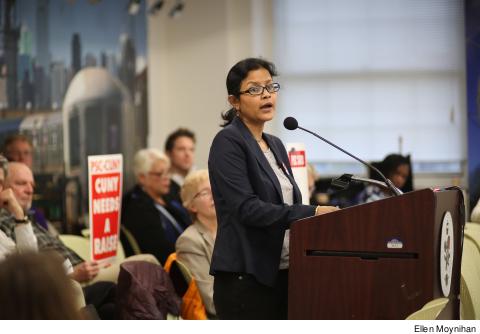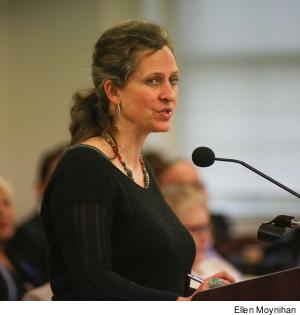The thousands of adjunct instructors throughout CUNY are an important part of students’ lives and often have the same academic training as their full-time colleagues. Yet they are paid substantially less.
 |
At a CUNY Board of Trustees hearing at Queens Borough Hall on April 20, dozens of adjunct instructors testified about their experiences, with a unified demand: raise adjunct pay to $7,000 per course, per semester, bringing pay closer in line with adjuncts at other peer institutions.
They spoke of the sacrifices they make to give high-quality instruction to their students, often highlighting the unseen and uncompensated work they do with students outside the classroom. And the thrust of this demand was a pedagogical one: as long as adjuncts are paid rock-bottom wages, the quality of students’ education will suffer.
PSC members argued that many adjuncts are not part-time instructors, but rather full-time instructors compensated at a part-time wage while carrying the burden of teaching the majority of courses at CUNY.
“It is unconscionable to balance CUNY’s budget on the backs of adjuncts,” PSC President Barbara Bowen told Clarion. “The Board of Trustees must make significantly increased adjunct pay a priority. The university must step up.”
Students need us
Raising CUNY adjunct pay to $7,000 per course will improve CUNY’s impact nationally and internationally. As a computer science adjunct lecturer, I want to be able to focus solely on my students and their work, but as a result of low wages, teaching can never be my top priority.
To properly train my students, I need time to adapt my lectures and exams to their specific needs. These exams require a lot of time to grade properly and are much more useful to the students (compared to multiple choice questionnaires for example).
Increased pay will also allow me to hold longer one-on-one office hours, making sure no student feels abandoned. Increased pay means I can spend more time doing research, staying on the cutting edge of my academic field, thus helping my students acquire the skills most in demand by potential employers. The current state of pay for CUNY adjunct lecturers does not allow us to dedicate ourselves to CUNY and its students.
Felix Grezes,
Hunter College
We deserve respect
I have taught one class at Queens College since 1983. That was the year a film I wrote, Vigilante, was released. Since then, I have become successful enough that I was named a lifetime member of the Writers Guild of America East and was elected to its council for a two-year term in 2012. I have worked with film producers who have either produced, starred in or directed my work and that list includes Francis Ford Coppola, Ed Harris, Walter Matthau, Carol Burnett, Jason Alexander, Agnieszka Holland and George Clooney to name a few.
NOT APPRECIATED
I have written scripts for Paramount, Universal, ABC, CBS, Disney and yet what gives me the most satisfaction is helping students who come to Queens College from all over the world to learn how to write movies. And I’m treated like a seasonal worker by the Board of Trustees at CUNY. I am hired semester by semester and my pay, though I’ve been teaching nearly nonstop since 1983, is abysmal.
I do not believe I’m appreciated by this educational system. However, I haven’t complained because, as I stated, I love teaching at Queens. Yet now is the time to give me equal pay for all I have contributed to Queens College and pay all those others who work as hard as me to educate the young minds who come to our classrooms hopeful that what they learn will give them the opportunity to change their lives. I’m only asking for the respect, I and others like me, deserve.
Richard Vetere,
Queens College
Same work for less pay
Adjuncts should receive the same pay as full-time staff. We do the same work and, in many cases, do the work more effectively. We often teach sections with more students than our full-time counterparts. As a teacher, professional developer with the UFT Teacher Center and a Literacy Coach for over 36 years with the Department of Education, I believe that I am infinitely more qualified to teach education methodology courses than those who have never taught in the system.
I have often found myself called a “practitioner” in a derogatory manner by certain full-time staff and there is an assumption that I am not knowledgeable in theory and only in practice, an assumption that is false. I have consistently kept up with best practices and current research and am fully capable of engaging in academic research and writing.
I am proud to be considered an effective practitioner. It was my choice to devote my career to working with students both at the middle and high school levels, as well as at the college level. I think I speak for many adjuncts when I say that we always put our students first, not research. Our students are our clients and they deserve our full attention.
Amy Greenberg,
Brooklyn College
Bulk of the work
I am not part time. I am full time at part-time pay. I teach four courses running from two CUNY campuses. I met an adjunct teaching six courses: two courses at CUNY, two at St. Johns and two at Fordham. I heard about an adjunct teaching nine courses in one semester.
I mentor students, I assist students with applying for internships, for scholarships. I am on the board of trustees for a scholarship here at CUNY. I advise students about what courses to take and what to major in. I write letters of recommendation. I have to change incomplete grades from the previous semester. This semester I had to advise a student not to commit suicide because his course load was too much. I had to send him to counseling. I had to alert his academic adviser, all without compensation.
While CUNY invests in technology and in building new science centers, it has not invested in the adjuncts who teach its courses. At any one time a building that should be 100 percent full with teachers is only 40 to 50 percent full because adjuncts are rushing off to another campus to teach so adjuncts cannot be there for their students.
Adjuncts comprise 60 percent of the teaching staff at CUNY. Adjuncts teach more than 70,000 courses. Every other teacher in a classroom is an adjunct. Adjuncts need pay parity. For the four courses I teach, I get paid for one office hour. I should be paid for four office hours. Each class taught at CUNY needs to have a paid office hour. Adjuncts make as little as $25,000 a year for teaching a full-time load.
A 2010 Princeton study concluded people are not happier making more than $75,000 a year. Many people at CUNY make over $100,000 while adjuncts who teach the bulk of the courses make $25,000 a year. This is not just. CUNY could find money in its budget to pay adjuncts a fair wage. CUNY runs on adjuncts’ low wages.
The Modern Language Association recommended $7,000 a course….Adjuncts at CUNY make as low as $3,000 a course, and $7,000 a course would give adjuncts a living wage.
Susan DiRaimo,
PSC Vice President for Part-Time Personnel
This is ‘wage theft’
 |
The ethical issue is clear for those of us who are adjuncts, and that issue is wage theft. Wage theft, as you know, is the illegal practice of not paying workers for all of their work. As adjunct staff members, we work far more hours than we are compensated for, doing activities and tasks such as grading papers and reading student emails…. Every species on the Earth seems to survive and thrive. Adjuncts staffers work hard, and they are getting paid for teaching, but no one wants to feel exploited.
Joyce Timberlake,
Baruch College
A family tradition
I come from a family of teachers. My student evaluations at Hunter last fall ranked me across the board between “excellent” and “outstanding.” My Lehman student evaluations were similar. Both semesters, the Lehman College Department of English faculty members who observed my classes ranked my work as excellent. Teaching two classes per semester, I am making a wage that places me close to the poverty line in New York City. Only my freelance work as a grant writer has made it possible for me to survive this year.
Going forward, if I were to try to cover my expenses as a college teacher, I would have to take on many more classes. As it is, I spend many hours a week on lesson preparation and reading student work in addition to the time I spend in the classroom. When I began asking colleagues how they manage to grade 25 student essays four times a semester, in addition to all their other obligations, I learned they have developed systems that enable them to spend a fraction of the time I have been spending on each essay – literally a quarter to a fifteenth of the time I have dedicated to reviewing, correcting and commenting on student essays.
THE CREATIVE LIFE
 |
I moved to New York City from Montreal over 20 years ago to be a writer. It is always a balancing act to earn enough to sustain a creative life, and in my case, the work I did to support myself came to be extremely important to me. I have worked in public schools and underserved communities because the need is there and I consider it a meaningful way to live a creative life. Yet I have to be able to sustain myself to be able to help anyone else.
Stacey Engels,
Lehman and Hunter colleges
The living theater
 |
I bring in guest speakers and take my students, often out of class time, to meet industry professionals. In the last eight years I’ve connected my students with Oscar and Tony winners, major theater and film directors, and some of our country’s most lauded playwrights. Of course I don’t have to provide my students with these opportunities. But if I don’t create the best experience for them that I am capable of, then what is really the point? What I have had to do is make hard choices about how to give my students the best possible learning experience. I’m chagrined to admit that I have, in several of my courses, seriously scaled back the level of writing and research I’m asking my students to do. There is simply no way that I can grade up to 26 papers, prep for class, answer emails and meet students privately and then meet them on the weekend to watch and discuss plays.
Welker White,
Brooklyn College
Protest poem
 |
My testimony is as follows:
Vampires are real.
MFA required.
MFA required.
MFA requited.
MFA required.
Posted student loan transaction. April 11, 2017. Payment. Thank you. $396.26.
CUNY adjunct payroll. April 24, 2017. Advice No. 95654888 non-negotiable. Total: $933.09.
Posted student loan transaction. March 17, 2017. Payment. Thank you. $396.26.
CUNY adjunct payroll. March 24, 2017. Advice No. 95654888 non-negotiable. Total: $933.09.
Posted student loan transaction. February 7, 2017. Payment. Thank you. $396.26.
CUNY adjunct payroll. February 24, 2017. Advice No. 95654888 non-negotiable. Total: $933.09.
Posted student loan transaction. January 26, 2017. Payment. Thank you. $396.26.
Payment. Thank you.
Haley Bueschlen,
College of Staten Island
Listing hardships
 |
As one of four grievance counselors at the PSC assigned to address adjunct issues, I am a witness to the difficulties adjuncts experience, difficulties that are avoidable. It’s a hardship to have classes canceled at the last minute when you have prepared for the semester, when it cuts you off from the three-year appointment.
Is it really impossible to have smaller classes? The 29-person cap for a writing class, which I experience at Burough of Manhattan Community College, is way too many. It doesn’t give enough time to grade papers or meet with students. Five papers of four pages each – 580 pages. Not counting revisions, in-class writing and exams. Our graduation rate would go up if we had more time to guide our students.

